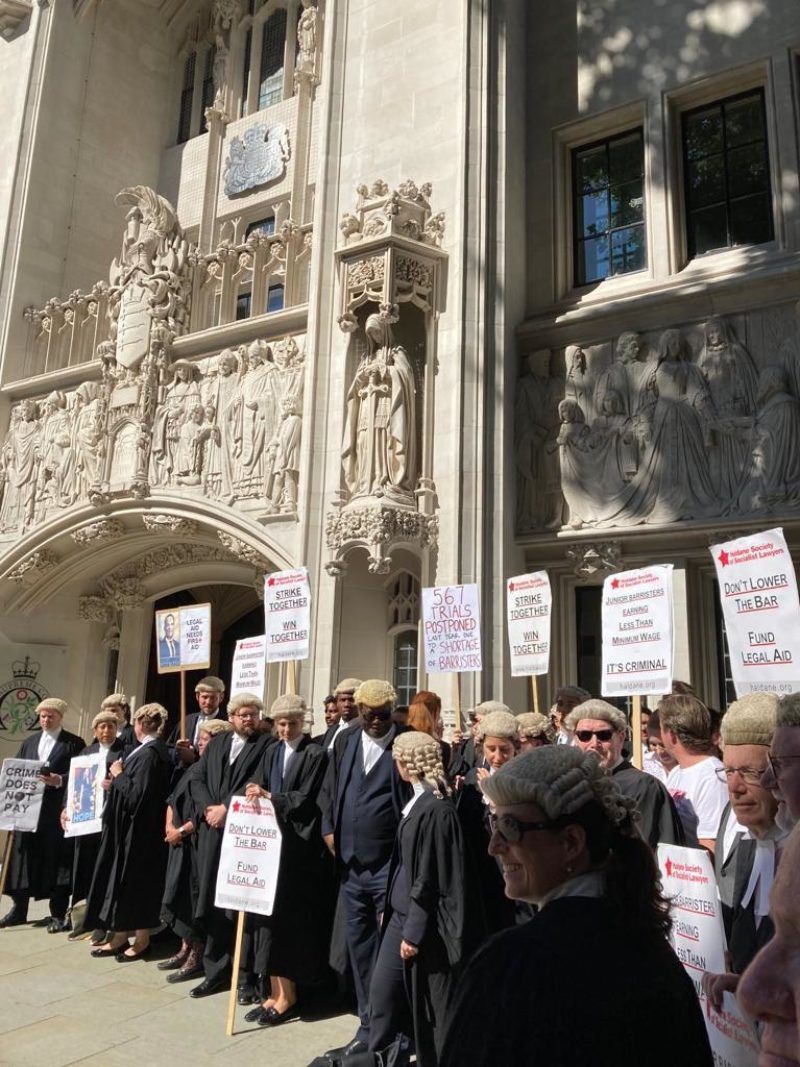
Criminal Barrister and HWG CLP member, Piers Mostyn explains the background to the Criminal Bar Association’s all-out strike and how it brings to a head a crisis in the criminal legal system that has been long in the making.
Criminal barristers are going on an all-out strike from September, action that is expected to grind the courts to a halt and will coincide with the new Tory leader taking office as Prime Minister. The dispute commenced in April with a process of escalation since then in response to the government’s complete failure to engage. The Criminal Bar Association (CBA) ballot for escalation saw 80% in favour on a turnout of around 90%.
The dispute has festered for over a decade as successive governments have cut fees payable for criminal legal aid work and added to an increasingly heavy workload that routinely involves a working week of 60, 70 hours or more – without any extra pay. This has been against a background of savage cuts to the Ministry of Justice budget – with job losses, court closures and a reduction in judge “sitting days”.
As a consequence the value of the fees paid for criminal legal aid work has been reduced by 30% in the past 15 years. The impact has been sharpest on new entrants to the profession who can expect a median income of £12,200 a year for long hours at an hourly rate of £6.40 – below the minimum wage.
Unable to survive and with massive student debts from years of training, many have been forced to leave the profession. More experienced criminal barristers have voted with their feet – moving to other legal fields, different jobs or retiring. As a result in the past 5 years there has been a 25% decrease in the number of criminal barristers. In the year 2021-22 this meant over one thousand trials being postponed due to the non-availability of counsel.
This is threatening to turn the clock back on decades of painfully slow progress in improving diversity within the profession. Thirty years ago it was dominated by white private school-educated men – poorly equipped to understand, communicate with, empathise with or command the confidence of clients who are working class and disproportionately from black or minority ethnic communities. Today’s barristers are almost 50% female with substantial representation from working class and minority communities. But they are the ones being driven out – as only those from privileged backgrounds can access the financial resources needed.
All this has had a major impact on victims, defendants and the communities most impacted by crime. Public confidence in the criminal justice system has declined as, starved of resources, there has been a growing backlog of cases. By 2019 this had grown to 41,000. The pandemic led to a further rise taking the backlog to nearly 60,000 – with a Tory promise to open a string of “Nightingale Courts” never really materialising despite the availability of many suitable buildings.
Underlying this has been a complete failure to invest serious resources into what is a major arm of the state that underpins a web of related institutions – police, prisons, probation and work around complex social and health issues such as youth alienation, racism, addiction and mental health. And yet the government saved £240 million during the pandemic in unpaid legal aid fees that is, as yet, unaccounted for. And a massive prison building programme is planned – presumably so that many more can languish in gaol waiting for trials.
Cuts and “reforms” to legal aid over the past 15 years have also had a devastating impact on criminal legal aid solicitors – with good firms being forced to close or change their area of practice as they struggle to operate on impossibly tight budgets. A lack of local advice and representation has led to “legal aid deserts” in some parts of the country.
Ten years ago few barristers would consider themselves to be trade unionists or go on strike – apart from anything else fearful of public reaction or the impact on their clients. But that has changed. Firstly successive governments have simply refused to respond to every form of reasonable representation. Secondly, the public see the present crisis not as one created by barristers. The strike is simply bringing this crisis to a head rather than allow years of further decline and disintegration.
Three years ago there was overwhelming support for action in a CBA ballot on this issue. industrial action was then suspended on the vote of a narrow majority when the government promised an independent review in autumn 2019. A promise accepted in good faith. Good faith that proved to be completely absent on the government side. There was no review report for 2 1/2 years. In November 2021, Lord Bellamy then advised an immediate 15% increase as a minimum starting point with a further package to follow. Doing nothing for six months the government then offered 15% but only on new cases starting after October 2022. This means that, due to the backlog, none of these fees will be paid for another 2-3 years – by which time there will have been inflation of 20% or more. We are striking now for an immediate increase of 25% across all cases plus a further package of measures.
Strike action to date has been very effective – disrupting 80% of cases. There has been remarkable support from the public – including understanding from those adversely affected. We are striking in defence of a properly funded, fair and efficient justice system that is able to provide legal aid for some of the most vulnerable and disadvantaged people.
Piers Mostyn, Hornsey & Wood Green CLP, Garden Court Chambers and CBA member

